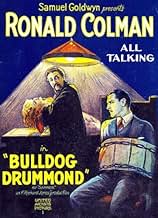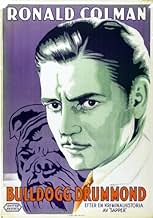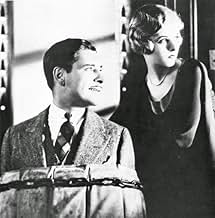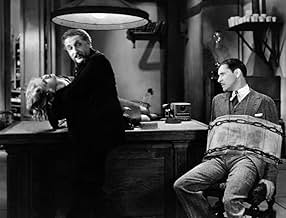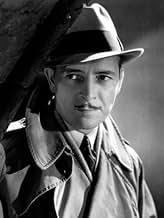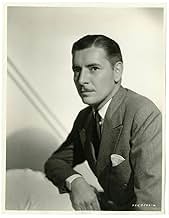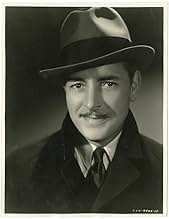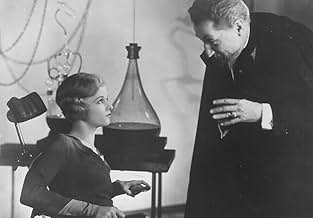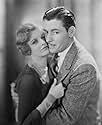VALUTAZIONE IMDb
6,3/10
1416
LA TUA VALUTAZIONE
Aggiungi una trama nella tua linguaA bored WWI veteran helps out a young woman whose uncle is being held hostage by embezzlers.A bored WWI veteran helps out a young woman whose uncle is being held hostage by embezzlers.A bored WWI veteran helps out a young woman whose uncle is being held hostage by embezzlers.
- Regia
- Sceneggiatura
- Star
- Candidato a 2 Oscar
- 5 vittorie e 2 candidature totali
Claud Allister
- Algy
- (as Claude Allister)
Bill Johnson
- Little Boy
- (non citato nei titoli originali)
Tom Ricketts
- Colonel in Club
- (non citato nei titoli originali)
Recensioni in evidenza
This started off yet another series devoted to the exploits of a literary detective figure (though he is actually an ex-British military officer); even if the films themselves never reached particular heights and, following the first two entries starring Ronald Colman (both, incidentally, included in the "Wonders In The Dark" poll), fell definitely into the B-movie league, this initial outing did yield two Oscar nominations for Best Actor and Best Art Direction (William Cameron Menzies)!
Despite being 85 years old and thus understandably stagey in treatment, the film survives quite nicely as pure entertainment (save for the frequent singing by a young man at an inn, summarily booted out when the villains turn up!), and can even be seen to have left its mark on culture (the presence of both a mad doctor and a femme fatale among its cast of characters). It is only the attitudes that have dated: Drummond's constant cheerfulness and over-confidence (we never really feel he is in danger throughout, also because there is a chivalric sense of mutual respect between hero and antagonist – though he does dispose violently and gratuitously of the slow-talking scientist, albeit offscreen); the latter, then, is an archaic gangster type; Drummond is assisted by silly ass Claud Allister's Algy (who, annoyingly, repeatedly asks for the afore-mentioned vamp's telephone number as if it were the most natural thing to do under the circumstances, or that she would ever even deign to give him the time of day!) and a butler; Drummond's romantic attachment to the heroine is likewise merely an obligatory convention (though 38 at the time, Colman always seemed to look middle- aged – which makes him that more unsuited to blonde Joan Bennett, not yet out of her teens and still a decade away from her 1940s heyday!). Curiously enough, though this tale is depicted as being Drummond's baptism of fire in the sleuthing business, the villainess already calls him by his "Bulldog" nickname!
Being a Samuel Goldwyn production, the film is slickly-handled (Gregg Toland was one of the cinematographers) and, as I said, includes a number of welcome elements that would eventually find their utmost expression in other popular genres (horror, noir and espionage thrillers – the latter in the deployment of a criminal organization, even if their objective here involves nothing more earth-shattering than the simple extortion of money!).
Despite being 85 years old and thus understandably stagey in treatment, the film survives quite nicely as pure entertainment (save for the frequent singing by a young man at an inn, summarily booted out when the villains turn up!), and can even be seen to have left its mark on culture (the presence of both a mad doctor and a femme fatale among its cast of characters). It is only the attitudes that have dated: Drummond's constant cheerfulness and over-confidence (we never really feel he is in danger throughout, also because there is a chivalric sense of mutual respect between hero and antagonist – though he does dispose violently and gratuitously of the slow-talking scientist, albeit offscreen); the latter, then, is an archaic gangster type; Drummond is assisted by silly ass Claud Allister's Algy (who, annoyingly, repeatedly asks for the afore-mentioned vamp's telephone number as if it were the most natural thing to do under the circumstances, or that she would ever even deign to give him the time of day!) and a butler; Drummond's romantic attachment to the heroine is likewise merely an obligatory convention (though 38 at the time, Colman always seemed to look middle- aged – which makes him that more unsuited to blonde Joan Bennett, not yet out of her teens and still a decade away from her 1940s heyday!). Curiously enough, though this tale is depicted as being Drummond's baptism of fire in the sleuthing business, the villainess already calls him by his "Bulldog" nickname!
Being a Samuel Goldwyn production, the film is slickly-handled (Gregg Toland was one of the cinematographers) and, as I said, includes a number of welcome elements that would eventually find their utmost expression in other popular genres (horror, noir and espionage thrillers – the latter in the deployment of a criminal organization, even if their objective here involves nothing more earth-shattering than the simple extortion of money!).
When the first "Bulldog Drummond" stories came out in the 1920s, Great Britain was trying to come to grips with an anomaly: it had been one of the main allied victors in the Great War but the country did not feel like it won anything. It felt it had sacrificed too much.
Britain in 1914 had ruled the waves. It had a small (but apparently competent) standing army. It had a history of democracy that was stable and unmatched by any of the major continental powers of Europe. It had a very highly industrial economy and was commercially quite important on the globe. Finally, it's empire stretched around the world that the boast that "the sun never set on the British Empire" was true - it was also the world's largest empire.
In truth Britain's empire was actually wearing away. Though the British technically won the Boer War Boer Leaders ended up running South Africa. Ireland was getting hotter. The Germans helped stimulate the Easter Rebellion with arms. The British Navy did control the seas but the u-boats almost beat Britain during the war. The naval battles were marred by a total German triumph under Von Spee in the Pacific (Coronel)and the lopsided British ship and men losses at their "victory" at Jutland. Finally, Germany and the U.S. had outstripped British commerce and industrial output by 1914.
With the huge losses of a generation of men, and no tangible gains, Britain was in for a serious period of reactionary feelings and even race baiting. Anti-Semitism (always under the surface) reemerged in the 1920s, mostly due to the rise of Bolshevism in Russia after the 1917 revolutions. The political landscape did not reduce this hysteria. Lloyd George was booted out of the Prime Minister's seat forever in 1922. His successor, Andrew Bonar Law, died after nine months in office. Stanley Baldwin was not fully ready to be Prime Minister in 1923, and would blow his administration by a public hissy fit. His rival, James Ramsay MacDonald, would be the first Labor Prime Minister. But he'd been an outspoken pacifist in the war, and he was suspect of Bolshevistic sympathies (he actually had none). In the 1924 General Election a forged letter (supposedly from Gregory Zinovieff, the head of the Russian Comintern) urged MacDonald's election as an agent of the Russians. Baldwin regained office with a large majority.
It is this background that explains the popularity of "Bulldog Drummond". With governmental drift and doldrums, a declining economy, a feeling of loss of face on the international scene, and a feeling of loss due to immense death toll, the search for easy answers, easy suspects, easy enemies was ready for Sapper's poison. So the public cheered Col. Hugh "Bulldog" Drummond as he created a fascistic group of ex soldiers (like the German Freikorps) to "control" the internal enemy (i.e., Bolsheviks, Jews, Irish). I might add this was not totally made up. Lloyd George gave the go ahead while Prime Minister to create a paramilitary group in Ireland, the "Black and Tans", to combat the Irish revolutionaries. This group was finally decimated by Michael Collins' men on "Bloody Sunday" in 1921.
That Samuel Goldwyn, a Jewish American film producer, produced BULLDOG DRUMMOND, is highly ironic. But it illustrates the care Goldwyn brought to his projects. He had been producing the silent film hits that Ronald Colman appeared in in the late 1920s. Goldwyn wanted Colman to make the transition to sound carefully, and not fall on his face like Colman's rival John Gilbert. Instead of "Darling, I love you!" in HIS GLORIOUS NIGHT, Goldwyn found an exciting adventure part for Colman, which allowed him to display his wonderful, gentleman's speaking voice. As an introduction for a talking Colman, BULLDOG DRUMMOND could not be beaten.
The role had everything to show Colman's versatility. There was his humor, shown at the beginning when he is dismayed at the ridiculously boring men's club he belongs to (full of old fogies). There was his romantic side, with the youthful Joan Bennett. There is his confrontations with the sinister Lawrence Grant (Dr. Lakington) and Grant's two assistants Montague Love and Lilyan Tashman (Carl Peterson and Irma), and his handling of his impossibly stupid friend Algy (Claude Allister). As a "coming out" role for talkies, BULLDOG DRUMMOND did the trick, winning Colman the audience he feared talking films would cost him.
In terms of plot it creaks, with incredible coincidences and twists that allow plot points to fall apart for the creation of new plot points. Still the cast is game, and the script surprises us. Lakington, briefly having Drummond tied up, is speaking to him pretty closely. Colman turns his face from Grant, who accuses him of being more cowardly than he'd admit. Colman rejects this excuse. Then why turn your face away, demands Grant. "Haven't your best friends told you?", says Colman, leaving Grant turning crimson at the thought of halitosis. A later bit of business, allowing Love and Tashman to escape is also unexpected. Yes, it is an antique, but it is a charming one. And as it has none of Sapper's racist crap in it, it is highly recommended.
Britain in 1914 had ruled the waves. It had a small (but apparently competent) standing army. It had a history of democracy that was stable and unmatched by any of the major continental powers of Europe. It had a very highly industrial economy and was commercially quite important on the globe. Finally, it's empire stretched around the world that the boast that "the sun never set on the British Empire" was true - it was also the world's largest empire.
In truth Britain's empire was actually wearing away. Though the British technically won the Boer War Boer Leaders ended up running South Africa. Ireland was getting hotter. The Germans helped stimulate the Easter Rebellion with arms. The British Navy did control the seas but the u-boats almost beat Britain during the war. The naval battles were marred by a total German triumph under Von Spee in the Pacific (Coronel)and the lopsided British ship and men losses at their "victory" at Jutland. Finally, Germany and the U.S. had outstripped British commerce and industrial output by 1914.
With the huge losses of a generation of men, and no tangible gains, Britain was in for a serious period of reactionary feelings and even race baiting. Anti-Semitism (always under the surface) reemerged in the 1920s, mostly due to the rise of Bolshevism in Russia after the 1917 revolutions. The political landscape did not reduce this hysteria. Lloyd George was booted out of the Prime Minister's seat forever in 1922. His successor, Andrew Bonar Law, died after nine months in office. Stanley Baldwin was not fully ready to be Prime Minister in 1923, and would blow his administration by a public hissy fit. His rival, James Ramsay MacDonald, would be the first Labor Prime Minister. But he'd been an outspoken pacifist in the war, and he was suspect of Bolshevistic sympathies (he actually had none). In the 1924 General Election a forged letter (supposedly from Gregory Zinovieff, the head of the Russian Comintern) urged MacDonald's election as an agent of the Russians. Baldwin regained office with a large majority.
It is this background that explains the popularity of "Bulldog Drummond". With governmental drift and doldrums, a declining economy, a feeling of loss of face on the international scene, and a feeling of loss due to immense death toll, the search for easy answers, easy suspects, easy enemies was ready for Sapper's poison. So the public cheered Col. Hugh "Bulldog" Drummond as he created a fascistic group of ex soldiers (like the German Freikorps) to "control" the internal enemy (i.e., Bolsheviks, Jews, Irish). I might add this was not totally made up. Lloyd George gave the go ahead while Prime Minister to create a paramilitary group in Ireland, the "Black and Tans", to combat the Irish revolutionaries. This group was finally decimated by Michael Collins' men on "Bloody Sunday" in 1921.
That Samuel Goldwyn, a Jewish American film producer, produced BULLDOG DRUMMOND, is highly ironic. But it illustrates the care Goldwyn brought to his projects. He had been producing the silent film hits that Ronald Colman appeared in in the late 1920s. Goldwyn wanted Colman to make the transition to sound carefully, and not fall on his face like Colman's rival John Gilbert. Instead of "Darling, I love you!" in HIS GLORIOUS NIGHT, Goldwyn found an exciting adventure part for Colman, which allowed him to display his wonderful, gentleman's speaking voice. As an introduction for a talking Colman, BULLDOG DRUMMOND could not be beaten.
The role had everything to show Colman's versatility. There was his humor, shown at the beginning when he is dismayed at the ridiculously boring men's club he belongs to (full of old fogies). There was his romantic side, with the youthful Joan Bennett. There is his confrontations with the sinister Lawrence Grant (Dr. Lakington) and Grant's two assistants Montague Love and Lilyan Tashman (Carl Peterson and Irma), and his handling of his impossibly stupid friend Algy (Claude Allister). As a "coming out" role for talkies, BULLDOG DRUMMOND did the trick, winning Colman the audience he feared talking films would cost him.
In terms of plot it creaks, with incredible coincidences and twists that allow plot points to fall apart for the creation of new plot points. Still the cast is game, and the script surprises us. Lakington, briefly having Drummond tied up, is speaking to him pretty closely. Colman turns his face from Grant, who accuses him of being more cowardly than he'd admit. Colman rejects this excuse. Then why turn your face away, demands Grant. "Haven't your best friends told you?", says Colman, leaving Grant turning crimson at the thought of halitosis. A later bit of business, allowing Love and Tashman to escape is also unexpected. Yes, it is an antique, but it is a charming one. And as it has none of Sapper's racist crap in it, it is highly recommended.
The year 1929 was a pivotal year in Hollywood for the talkie with a great rise in the percentage of all talking pictures and a slowdown on silents. Ronald Coleman, a box office star in silent pictures, makes his talking debut. Audiences of the day were pleased with his wonderfully cultured English. Also giving great support is Claude Allister as his wealthy society friend Algy. Joan Bennett in her film debut at age 18 shows her inexperience, though her lines are not much to work with, and Lawrence Grant as the evil Dr. Lackington hams it up like John Barrymore and delivers his lines at the slow and deliberate pace of Bela Lugosi.
Captain Hugh "Bulldog" Drummond is a wealthy retired office of the British army who yearns for another war to fight. Like Bruce Wayne (Batman), he wants to use his skills to help those in need. He answers the call to meet Joan Bennett at the Green Bay Inn and finds out that her father is being held against his will and tortured at a nursing home run by the evil Dr. Lackington (Grant). Montague Love is Dr. Lackington's strong man. In one very funny scene Love goes to the Green Bay Inn to catch Drummond. An Irish tenor has been singing and playing his accordion all evening. Love and a crony toss him out the door with his accordion making glissandos as it exits with him.
Drummond has a stable of cars of which two are shown in the film. The one he chooses to drive is a Mercedes SSK (the Excalibur is a copy of it). He drives it at night with the top down wearing a hat, scarf, and trench coat. Algy and his valet are always nearby following him in his Rolls Royce!
This movie might seem crude by today's standards, but judging it in the context of its time, it is far more entertaining than the poor musicals or slow boring adaptations of plays that the talkies usually featured during this era. Compare it with "The Great Gabbo" also released that year or "Annie Christie" , Garbo's first talkie released in 1930, and you'll see what I mean. In my opinion it's the best talkie prior to "All Quiet on the Western Front", which was filmed in 1929 and released the following year and went on to win "Best Picture".
Captain Hugh "Bulldog" Drummond is a wealthy retired office of the British army who yearns for another war to fight. Like Bruce Wayne (Batman), he wants to use his skills to help those in need. He answers the call to meet Joan Bennett at the Green Bay Inn and finds out that her father is being held against his will and tortured at a nursing home run by the evil Dr. Lackington (Grant). Montague Love is Dr. Lackington's strong man. In one very funny scene Love goes to the Green Bay Inn to catch Drummond. An Irish tenor has been singing and playing his accordion all evening. Love and a crony toss him out the door with his accordion making glissandos as it exits with him.
Drummond has a stable of cars of which two are shown in the film. The one he chooses to drive is a Mercedes SSK (the Excalibur is a copy of it). He drives it at night with the top down wearing a hat, scarf, and trench coat. Algy and his valet are always nearby following him in his Rolls Royce!
This movie might seem crude by today's standards, but judging it in the context of its time, it is far more entertaining than the poor musicals or slow boring adaptations of plays that the talkies usually featured during this era. Compare it with "The Great Gabbo" also released that year or "Annie Christie" , Garbo's first talkie released in 1930, and you'll see what I mean. In my opinion it's the best talkie prior to "All Quiet on the Western Front", which was filmed in 1929 and released the following year and went on to win "Best Picture".
Bulldog Drummond is best known for being the debut of Ronald Colman in sound pictures. It was one auspicious debut to say the least.
A whole lot is written about the stars who could not make the transition to sound, mainly because for one reason or another their voices did not match the screen persona they created. The other reason is that many tended to overact in the way they had to in silent films to put across their feelings.
But there are several examples of those players who voices completely matched their screen personalities so much so that I can't envision them in silent films. Stan Laurel and Oliver Hardy and W.C. Fields in comedy were so much better in sound I can't see how they did it silent films. Gary Cooper was another, his Montana drawl perfectly fit his screen image. William Powell's years of stage training and that perfect diction helped him bridge the transition.
But Ronald Colman was something unique. The greatest voice in the history of cinema, a man you could listen and be enthralled by him reciting your local yellow pages. His perfect Oxford English was so right for his character of English adventurer Bulldog Drummond.
This was the first Drummond film and the part was to be played by several other actors including Colman again. But this film seems to have set the format out. Drummond, a veteran of the World War, was your typical upper middle class English gent who's just plain bored by a rather useless life. He takes out an advertisement basically putting himself out in the way Edward Woodward did sixty years later in the television series The Equalizer. Of course he gets several replies back, but Colman responds to a note from American Joan Bennett.
It seems that Bennett's uncle, an American millionaire, is being held captive by Lilyan Tashman and her associates in a disguised asylum where they have him drugged and gradually turning over his fortune.
Bennett is a sweet young thing, but the role with real bite in it is Lilyan Tashman doing the kind of part Gale Sondergaard did later on. Tashman kind of has a thing for Colman, mainly because he's a man who doesn't fall for her charms as chief assistant Montagu Love has. No pun intended, but Montagu's practically her love slave.
Bulldog Drummond would have rated higher with me, but I simply could not stand Claud Allister's portrayal of Algy, Drummond's tag along friend from his club who's the quintessence of every silly sot of an Englishman every done on screen. I mean he's worse than useless, he's counterproductive. Colman should have let Tashman and her goons have him.
Noted radio singer Donald Novis sang a couple of songs in a country inn where a lot of the story takes place. Novis had a great lyric tenor and starred on Broadway and radio as well as making a few films. He's best know for playing the lead role on Broadway in Rodgers&Hart's Jumbo and introducing the song The Most Beautiful Girl in the World. This was Novis's screen debut, but sad to say he never had much of a film career.
For those fans of Ronald Colman, Anglophiles around the world who see in him the best embodiment of the UK national character.
A whole lot is written about the stars who could not make the transition to sound, mainly because for one reason or another their voices did not match the screen persona they created. The other reason is that many tended to overact in the way they had to in silent films to put across their feelings.
But there are several examples of those players who voices completely matched their screen personalities so much so that I can't envision them in silent films. Stan Laurel and Oliver Hardy and W.C. Fields in comedy were so much better in sound I can't see how they did it silent films. Gary Cooper was another, his Montana drawl perfectly fit his screen image. William Powell's years of stage training and that perfect diction helped him bridge the transition.
But Ronald Colman was something unique. The greatest voice in the history of cinema, a man you could listen and be enthralled by him reciting your local yellow pages. His perfect Oxford English was so right for his character of English adventurer Bulldog Drummond.
This was the first Drummond film and the part was to be played by several other actors including Colman again. But this film seems to have set the format out. Drummond, a veteran of the World War, was your typical upper middle class English gent who's just plain bored by a rather useless life. He takes out an advertisement basically putting himself out in the way Edward Woodward did sixty years later in the television series The Equalizer. Of course he gets several replies back, but Colman responds to a note from American Joan Bennett.
It seems that Bennett's uncle, an American millionaire, is being held captive by Lilyan Tashman and her associates in a disguised asylum where they have him drugged and gradually turning over his fortune.
Bennett is a sweet young thing, but the role with real bite in it is Lilyan Tashman doing the kind of part Gale Sondergaard did later on. Tashman kind of has a thing for Colman, mainly because he's a man who doesn't fall for her charms as chief assistant Montagu Love has. No pun intended, but Montagu's practically her love slave.
Bulldog Drummond would have rated higher with me, but I simply could not stand Claud Allister's portrayal of Algy, Drummond's tag along friend from his club who's the quintessence of every silly sot of an Englishman every done on screen. I mean he's worse than useless, he's counterproductive. Colman should have let Tashman and her goons have him.
Noted radio singer Donald Novis sang a couple of songs in a country inn where a lot of the story takes place. Novis had a great lyric tenor and starred on Broadway and radio as well as making a few films. He's best know for playing the lead role on Broadway in Rodgers&Hart's Jumbo and introducing the song The Most Beautiful Girl in the World. This was Novis's screen debut, but sad to say he never had much of a film career.
For those fans of Ronald Colman, Anglophiles around the world who see in him the best embodiment of the UK national character.
This was the second film of this title, the third Bulldog Drummond film to be made, and the first with sound (this being the first year of sound films). The original 'Bulldog Drummond' was a 1922 silent, which appears to be lost, starring Carlyle Blackwell. In 1925, 'Bulldog Drummond's Third Round' appeared, starring Jack Buchanan. A print survives, and has been shown at at least one film festival, but few have had the good fortune to see it. This is the classic Drummond film in a series which was to extend to 25 films, if one counts the 1983 satire 'Bullshot'. Ronald Colman is spectacular in the lead, perfect in every way for the part, wryly humorous, dashing, ardent, impetuous but thoughtful: in short, he was the very essence of Captain Hugh Drummond. The film opens with a famous scene, an amusing long tracking shot of the interior of the 'Senior Conservative Club' (fictitious, but modelled on the Carlton Club in St. James) in London, with old gents reading or nodding off in their leather armchairs. The first two times I saw this film, I thought it was meant to be Drummond's own club. But now I am inclined to believe that it is the club of his friend Algy, whose guest he is on this occasion. Drummond says to Algy that he is bored to tears: 'I'm too rich to work, but too intelligent to play'. Algy suggests that he place an ad in The Times seeking adventure, so he drafts one on the spot stating that he finds 'peace too tedious' and invites offers of danger and adventure. The Drummond books by 'Sapper' are based on a former Army captain from the late War, who gets together a band of former soldiers who had served under him in the trenches, in order to pursue adventure in peacetime. It played to the air of total disillusion which followed the First War, similar to that which engendered film noir after the Second War. The post-War motivation is essentially absent from this film, as it was ten years on and no longer fashionable to be moaning about it. This was the first and last sound film directed by the silent director F. Richard Jones, who died of TB the next year aged only 33. The villainess of this film is played chillingly by Lilyan Tashman (astonishingly aged only 20, though playing 40), but she died aged 34 in 1934. Claud Allister is an effete Algy with a monocle, his voice shrill enough to break a wine glass. He has a wonderful moment where he is awakened by a bird popping out of a cuckoo clock, and says: 'Is it really 2 o'clock? How I do detest bird life!' Lawrence Grant is wonderfully sinister as a mad scientist with a fake asylum. The film is stagey, old-fashioned, creaks at the joints, implausible, and Joan Bennett as the girl is so pathetically helpless and whimpering that one wants to scream with frustration. She only becomes the Joan Bennet we were later to know in the love scenes at the inn towards the end, where her voice suddenly deepens and she gets that Joan Bennett glint in her eyes, and the shrinking violet begins to turn into a prowling feline. Despite any flaws, this film is a true classic, conveying as it does so much period atmosphere and the overwhelming charm of Ronald Colman, who made most films he was in into absolute 'must-sees'. If you like Colman or you like Drummond, you have to see this.
Lo sapevi?
- QuizThe first (and only) sound film for former Mack Sennett director F. Richard Jones. His command of sound and action with this film was very well received, and he looked set for a bright future. Sadly, Jones succumbed to the tuberculosis epidemic that was running rampant at the time. He was only 37.
- BlooperThe players in the opening credits are set out in the form of a theatre programme. However, notwithstanding the film takes place in England, the spelling on the programme is the American 'program'. However, while the film is portrayed as taking place in England, it was produced in the U.S.; thus, the Americanized spelling of "program" in the credits is not inconsistent.
- Citazioni
Hugh 'Bulldog' Drummond: Danny, pack my bag. Pyjamas, toothbrush and a gun.
Danny: Please sir. Don't you really think sir? Yes sir.
Hugh 'Bulldog' Drummond: On second thought, never mind the pyjamas. Just the toothbrush and the gun.
- Curiosità sui creditiThe cast listing resembles a play program with six listed names/roles on each of two pages. Both pages have "Program Continued" at the top of the list and "Program Continued On Following Page" at the bottom.
- Versioni alternativeWhen first released in France, the film was presented in a talkie version in English with French subtitles and in a silent version.
- ConnessioniFollowed by Temple Tower (1930)
I più visti
Accedi per valutare e creare un elenco di titoli salvati per ottenere consigli personalizzati
- How long is Bulldog Drummond?Powered by Alexa
Dettagli
Botteghino
- Budget
- 550.000 USD (previsto)
- Tempo di esecuzione1 ora 30 minuti
- Colore
- Mix di suoni
- Proporzioni
- 1.20 : 1
Contribuisci a questa pagina
Suggerisci una modifica o aggiungi i contenuti mancanti

Divario superiore
By what name was Cercasi avventura (1929) officially released in India in English?
Rispondi
